The Halcyon Balance, the Praise, and the Linden Tree: Beethoven's Opus 111, Richard Smallwood's "Total Praise," and Schubert's "Der Lindenbaum"
Photo by the author, Deeann D. Mathews, January 30, 2024 -- a young cypress, since linden trees do not grow on Buena Vista Hill
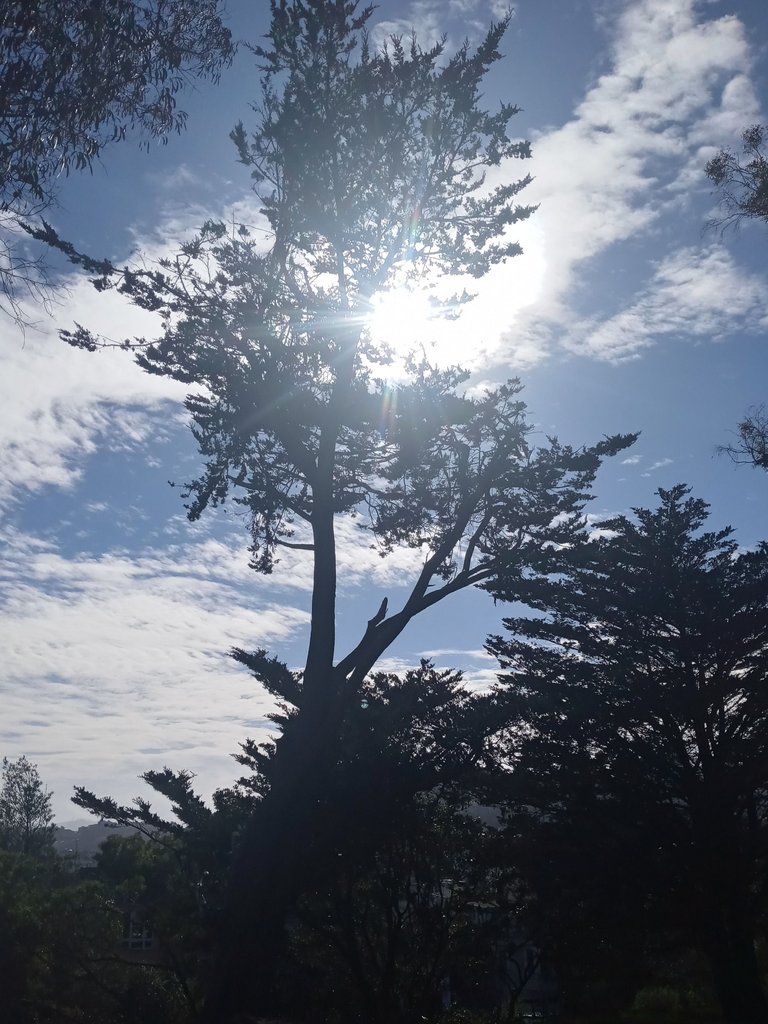
I only was able to take one day off during the halcyon of winter ... the next day required me to be back at work, with enough business to handle so that quite a number of Hive whales, with Hive around thirty cents, would not have been able to delegate enough to me to suffice me for dropping the ball. My journey of the day included San Francisco's City Hall, here seen from the northern corner of Alamo Square Park.
Photo by the author, Deeann D. Mathews, January 25, 2024
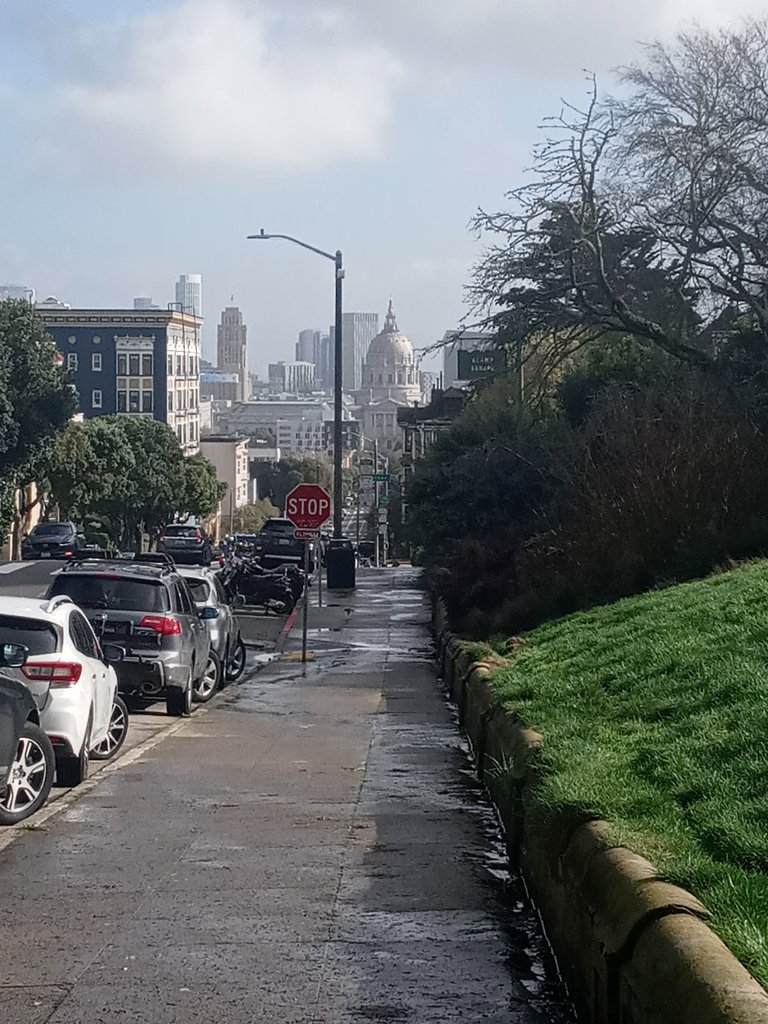
My plan was to get down there and thus into downtown San Francisco, do what had to be done, and take lunch where my heart cried out to be on the last day of the halcyon: climbing to the top of Buena Vista Hill ...
Photo by the author, Deeann D. Mathews, January 30, 2024
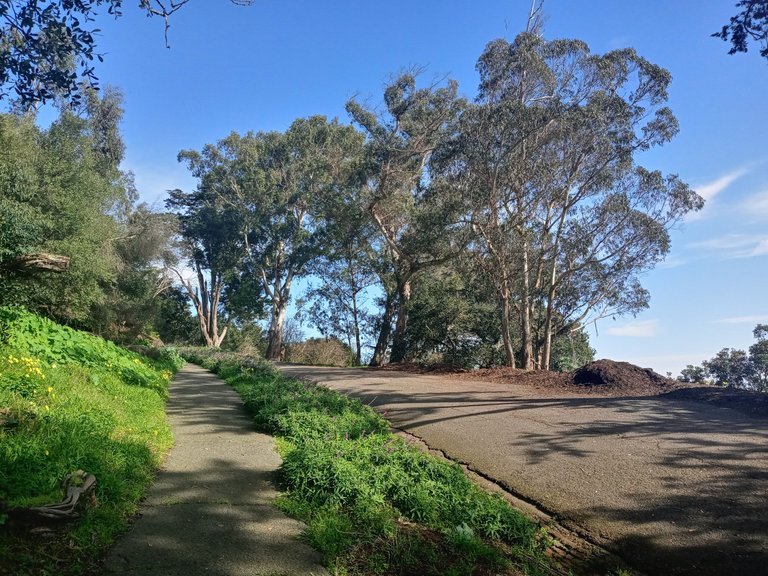
... and there rest and refresh my total self, the world and its bustle all become nothing but magnificent landscapes around me...
Photo by the author, Deeann D. Mathews, January 30, 2024
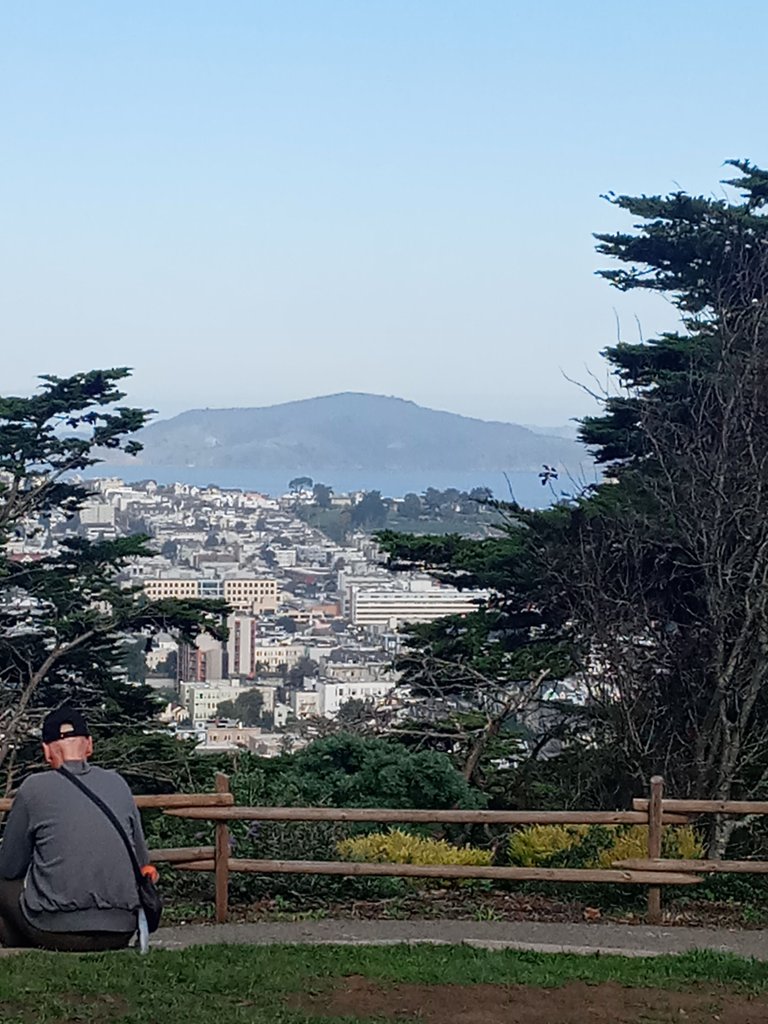
The very world itself, seen in the embrace of evergreen trees ... although the mistiness on the bay indicated change was ahead, and soon...
Photo by the author, Deeann D. Mathews, January 30, 2024

But I saw that without seeing it in the company of others enjoying this second day of halcyon as well. I forgot what they did not also seem to know ... that this would ever end ... that spring and summer had not yet come ... for who could feel that, in such a moment?
Photo by the author, Deeann D. Mathews, January 30, 2024
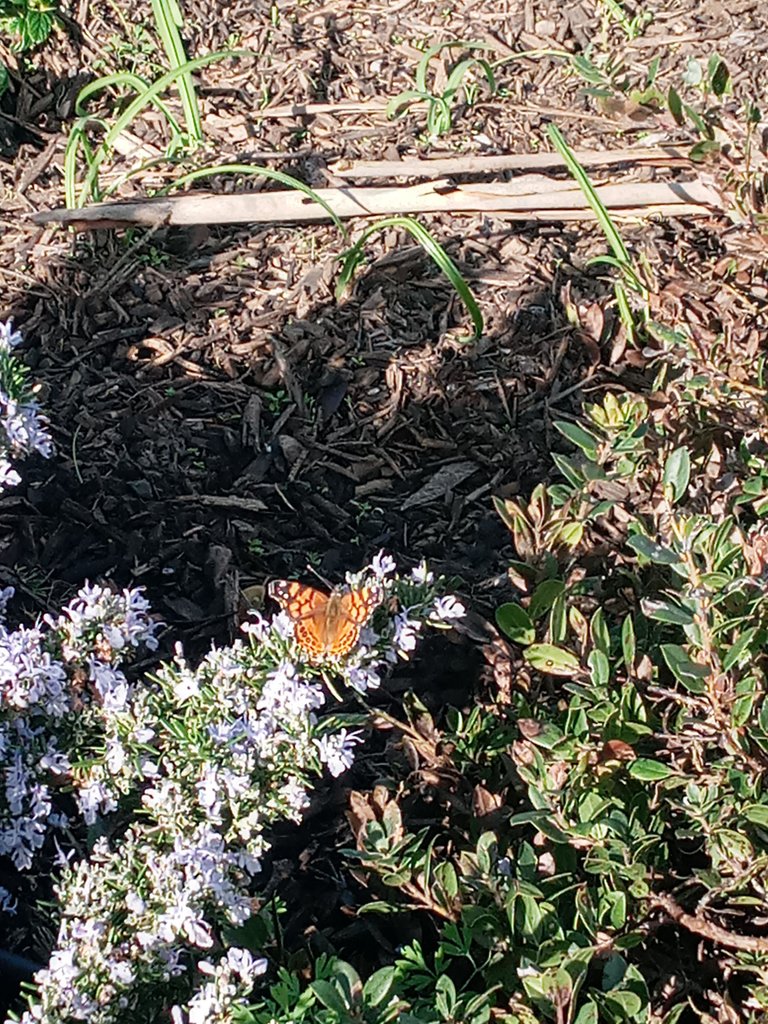
Now, if you really, really, REALLY want to forget that time and work and winter must go on -- for a true out-of-this-world experience -- go to the top of Buena Vista Hill and turn on Beethoven's 32nd and last piano sonata, Opus 111, and listen to it with the sheet music rolling by and played on a fortepiano -- a near-period instrument!
Come to find out, Beethoven's last three piano sonatas were originally compared to the title under which they appear in this modern release: Magnificent Landscapes ... and so the irony, 28 years after my first hearing of these sonatas, of me releasing myself to prioritize time in some of San Francisco's most magnificent landscapes and then discovering these sonatas again! Of these, Opus 111 may as well be Mt. Everest, although Opus 109 and 110 share its massif and are near its equal in height (just like Lhotse and Cho Oyu are near their taller sibling in height).
The agony and the ecstasy ... the passionate, determined climb out of the shadowed valley into light that shows breathtaking new realms ... a bit more of a contrast than the edge of downtown San Francisco and City Hall versus the top of Buena Vista Hill for lunch, perhaps ... but the fact that I know that I can and should go to the hill to balance the bustle of the cold city core and its effects on me ... to know to get the most of the second halcyon day instead of just rushing on after that first one on which I found such deep healing ... yes, it was time for Opus 111.
In reading through the comments I also found an interesting theory about the second movement and its twice-repeated rhythm ... notably, Opus 109 and 110 are in the major mode, but between then and the completion of Opus 111, one of the candidates for Beethoven's Immortal Beloved passed away... Josephine von Brunsvik was only 42. One commenter thought the theme of the Arietta is Beethoven calling out that beloved name, one last time ... and then just once again.
Whether we think of it in English -- "Jo-se-phine ... Jo-se-phine" -- or German "Jo-se-phi-ne ... Jo-se-phi-ne..." once someone points it out at the beginning of the Arietta, one can hear it either way, although it is more subtle if one imagines German ... but if this is indeed the case, Opus 111, Beethoven's very last significant work for the piano, is an example of a man working through deep, intense grief and anger over a loss, a loss that went on for more than a decade even before her death ... and, while still in love, letting go, releasing the beloved to the wonderful memories ... releasing the beloved to go on in life without him ... and at last to the joys of Heaven ... and at last quietly, reverently moving on.
I was stunned to find the above theory, although GRANTED, Opus 111 does not need such an explanation, and I can imagine Beethoven thundering, in his well-known bass voice, "Correlation does not equal causation -- my Immortal Beloved is known only to me, and I protected her identity to my grave!" He did. We still do not know for certain who she was. That's love, and we must acknowledge that. From Beethoven I learned how to have a grand old soldier ... and give no more clue!
But the theory appeals ... and the reason was pointed out last week:
So, Frau Mathews, you have an Immortal Beloved story of your own, and you and he have recognized that you and he are called apart ... and you are 43. You have been tracking Beethoven a very long time, but with the faith of Bach -- and that is just on your adopted German side. The musicality and faith of your own ancestors is a world of power all its own -- and between those two, having both, there you are, Frau Mathews.
Now, 43 is not as old today as it was in the early 19th century ... but it is at age 43, not able to be united with the man I most deeply loved, that I have come to terms with that and the possibility of tracking Beethoven's track ... it is not lost on me that he made the decision around the same age to remain a bachelor and devote himself to his art because there was no way anyone could ever replace the Immortal Beloved in his heart. Later, he would write down that he knew he had made the right decision, and he had. He was 43 in 1813; had he forced things to work ... it is too long a story to tell, but, suffice it to say, he would not have been who he was meant to be before he passed in 1827.
HOWEVER, the difference between us -- even bigger than the centuries, the culture, and the sheer giftedness gap, of course -- is that I also have the faith of Bach. As a devout Christian, I can make a hard decision about my life only so far as God does not decide something else entirely. Beethoven neither had my problems, in terms of me being willful like every other human being and living with the fact that I often will not get my own way, nor my possibilities, in that God's guidance has never failed to be better than my ideas!
I therefore cannot with certainty say I will remain a bachelorette from here on out, because I have no idea what God has for me tomorrow. I can say, however, that I am content being single until otherwise called. My allergies are too severe for me to deal with the hay fever of searching for a golden needle in the world's haystack of men, and my standards are now TERRIFYINGLY HIGH. Now, I would never let a man know where he stands and from how far up I am looking down on him from where the love of my grand old soldier placed me ...
Photo by the author, Deeann D. Mathews, January 30, 2024
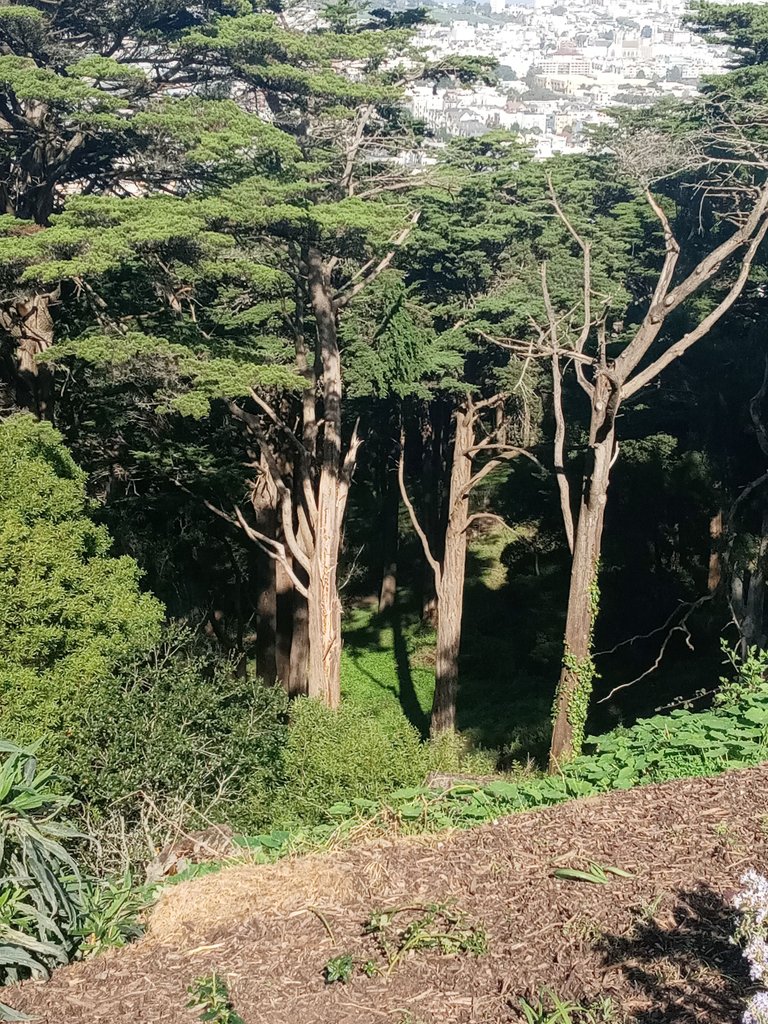
... but because of that alone, I have the feeling I will be walking and writing and making fractal art and music and taking life as it comes for quite some time ... and Opus 111 tells me that a life for a soul in fully expressed singleness can be wonderful.
Unlike Opus 109's set of variations that is always and ever going to sweep me into the Knockout Zone, Opus 111's set is just that much higher up. Like every mountain it starts at ground level where we all are ... it will walk and talk and skip and run and have fun, but is going gently up all the while, giving us a chance to acclimatize to the height ... until suddenly one turns a corner and one is staggered by the height passed over and sees the peak ahead ... and gets carried on up, and up, and up, and up... wide awake but far beyond perceiving anything but the experience at hand ... I generally find myself scarcely even breathing some moments past the end of Opus 111. It is the ideal piece of music for an afternoon sitting alone on a tall hill with a view on a day in the last deep calm between many storms ... I needed that rest, so much ...
Photo by the author, Deeann D. Mathews, January 30, 2024
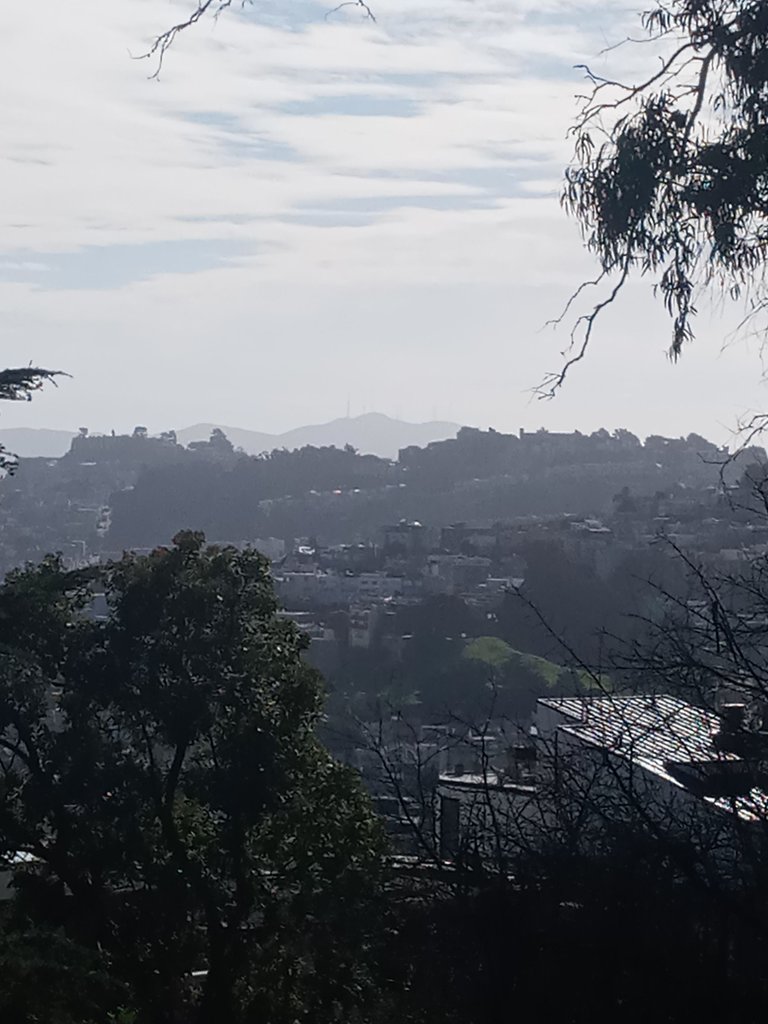
But it was not the only piece I had in mind, for as I thought of my physical journey to even be able to top Buena Vista Hill at will, and all the steps through 2022 and 2023 in such pain of the soul, to be where I was, at peace and rest and joy and with all paths open before me, another song came to mind ... for the faith of Bach is also the faith of my African American ancestors, and Richard Smallwood is that one gospel music composer who blended his natural and adopted classical heritage ... and so it is that opera star Morris Robinson brings that voice right across the gap in "Total Praise"!
Mr. Robinson, like Mr. Eric Hollaway, spans those gaps that I do, comfortably at home in both the world of classical and spirituals and gospel, and knowing that though we may go as high as earth can possibly go in music -- Opus 111 is one of those truly great peaks -- that does not compare to when we will step across in Christ in due time to deliver that Amen in person where nothing but joy shall be ... and sometimes it is given to us to bring that joy down here!
I have been in my home and everywhere, in two full spoken and musical languages, just giving thanks to God ... for indeed He gave me His peace to keep me in time of the storm, and brought me deeper into that peace ... all I can do sometimes lift my hands and heart and voice in total praise!
So, on top of my favorite hill, on that high plain of music as well ... time flew by ... and then I looked up, and the next storm front had quietly eased over the Sutro Greenbelt, only 2-3 miles distant.
Photo by the author, Deeann D. Mathews, January 30, 2024
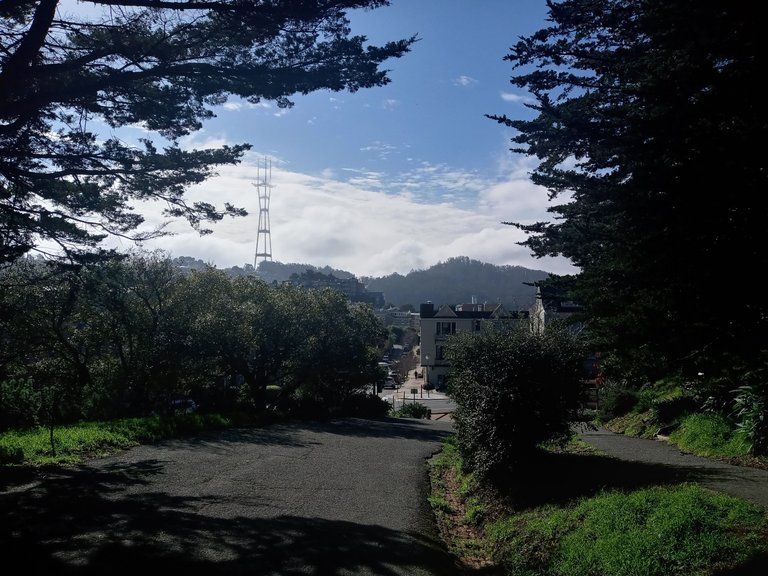
Still, because of where I was and the state I was in, the awesomeness struck me, but not the reality of how close it was until I was gently but firmly reminded ... the far, far distant thunder firmed up close enough so I could hear it in the person of the Ghost of Musical Greatness Past, in a hiking suit as white as the edge of that storm.
"You are very, very close to being where I live now, Frau Mathews ... if the air were thinner up here and you had fallen asleep during those last minutes of Opus 111 in which you were scarcely breathing as it was ... if you could have gone across to give that last Amen in person that Mr. Robinson and the West Angeles Church Gospel Choir gave, you would have ... you have come as close you may, and it could not be that you could transition back into everyday life without this time. But you must not be on this hill in a few hours. There is still no great hurry, but we must start down now."
I can say now from several days later: the halcyon ended with winter returning in greater violence than we had yet seen from it, and the violence of winter on Buena Vista Hill is deadly. Thus the approaches to the top of the hill have since been closed until further notice!
Now where I was -- and cannot again be for some time -- the sun was still shining and bees and butterflies and birds were doing what they do ... although I could not get a picture, some woodpeckers were pecking and eating in the shade of a great tree ... but it was like the rhythm at the beginning of the Arietta: once things were pointed out to you, you noticed. There was a very slight breeze -- just a puff of wind here and there, but cold enough to make itself felt even in the warmth of the sunshine, indicating that storm front was indeed moving slowly but steadily toward me.
I got up without fuss -- that was the last mood I could get myself into anyhow -- and we started down by the path of my companion's choosing: a slightly longer route, but more gentle in its descent.
Photo by the author, Deeann D. Mathews, January 30, 2024
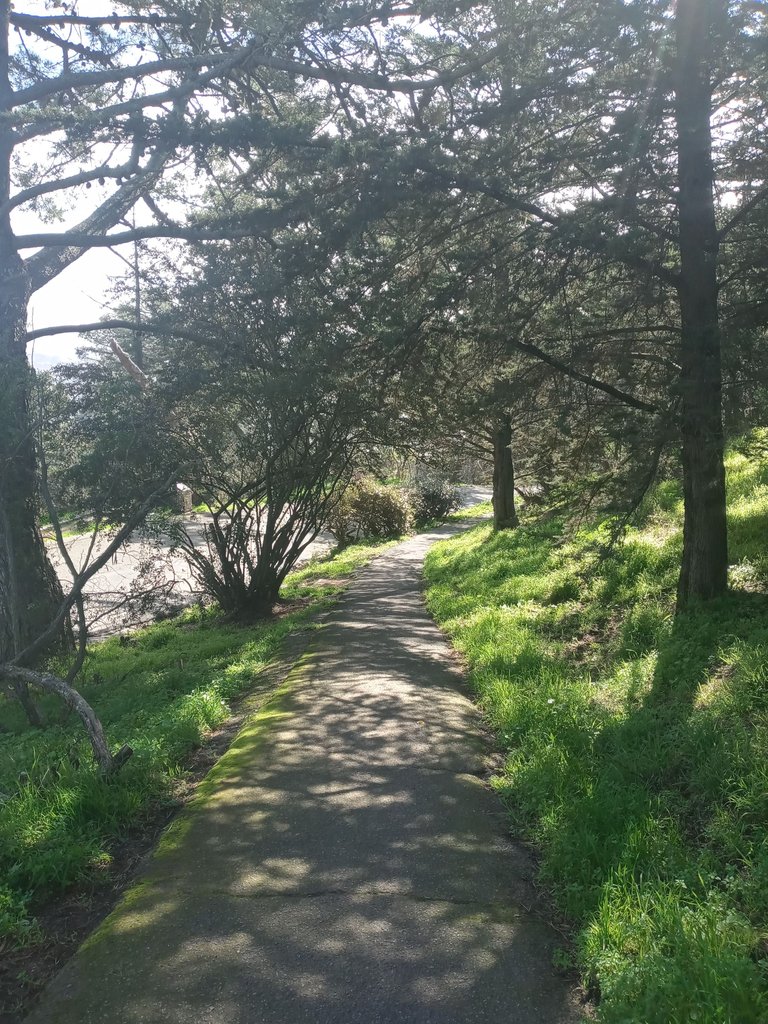
At the first paved street, THEN it hit me how close that storm front was ... Lone Mountain is only a mile from my home, and so even though it too was still in sunshine, the low clouds being pushed ahead of that front were getting behind it through the Golden Gate, into San Francisco Bay.
Photo by the author, Deeann D. Mathews, January 30, 2024

By the time we got down to Haight Street, the only major street on the northern portion of the lower hill, it was definitely getting colder ... and the bustle of Haight Street appeared to truly be the end of the halcyon and the return to the workaday world ... and yet .. these two days had changed me. I would as need required be in but not ever again of the hustle and bustle of the world, so long as I held to my own center.
"Which is why I came for you when I did, Frau Mathews, so we would not need to be in a hurry, and could pass Haight Street as you may now pass through the hustle and bustle of the world. The halcyon you have chosen will be at times be behind you, but so long as you choose it, it will also still before you."
We had time to go down through Golden Gate Park, and there, the halcyon was as of yet undisturbed. We walked right back into it.
Photo by the author, Deeann D. Mathews, January 30, 2024
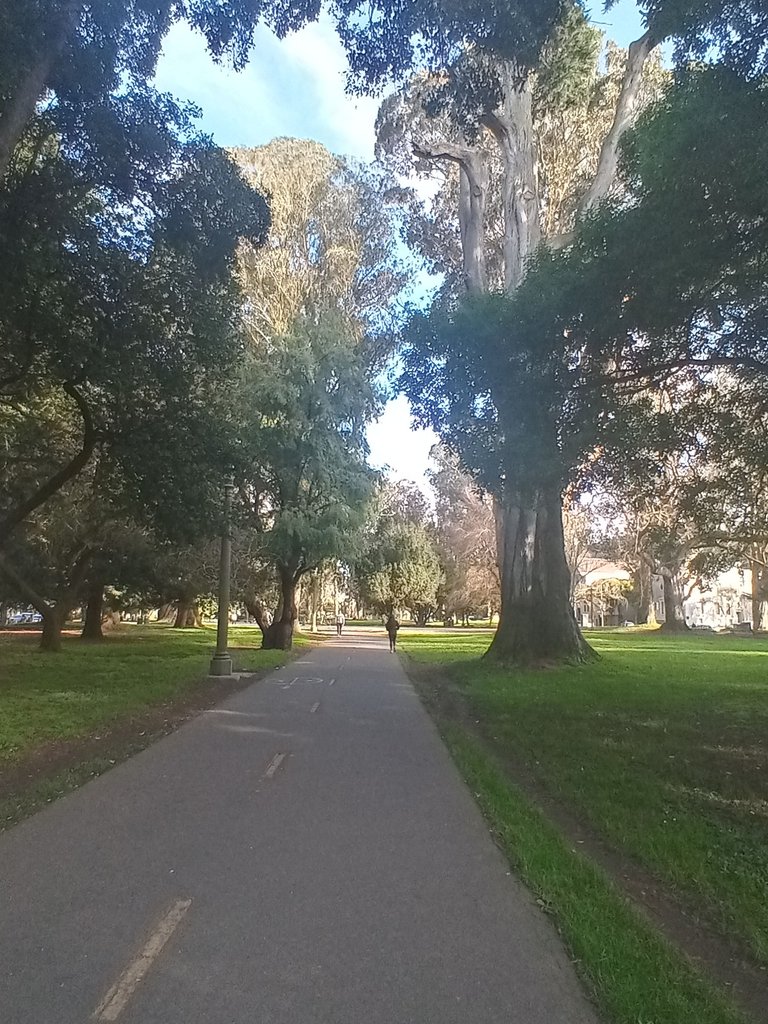
After a time, I saw in his face that this walk was moving him -- I mean, literally, we were moving, but while on the hill his thought had been to get me off of it. But now surrounded by such a scene, and in no hurry, there was a song on his mind.
"I must lose no occasion for your learning, Frau Mathews. You have come so far, and you must miss no step on my account, even though I was pleased to hear Mr. Morris Robinson today ... now he must increase, and I must decrease ... but because you have chosen me to stand in the place Ms. Linda Kotcher did for decades, I must not be derelict in my duty toward you. You still will hear deeply from me what you will not -- yet -- from another. You have taken quite the winter's journey, this past two days ... so again, we consider Schubert's version of the same."
We had come then to a meadow, and stopped ... for as long as his voice was in that meadow, it seemed impossible that any storm could ever come there.
Photo by the author, Deeann D. Mathews, January 30, 2024
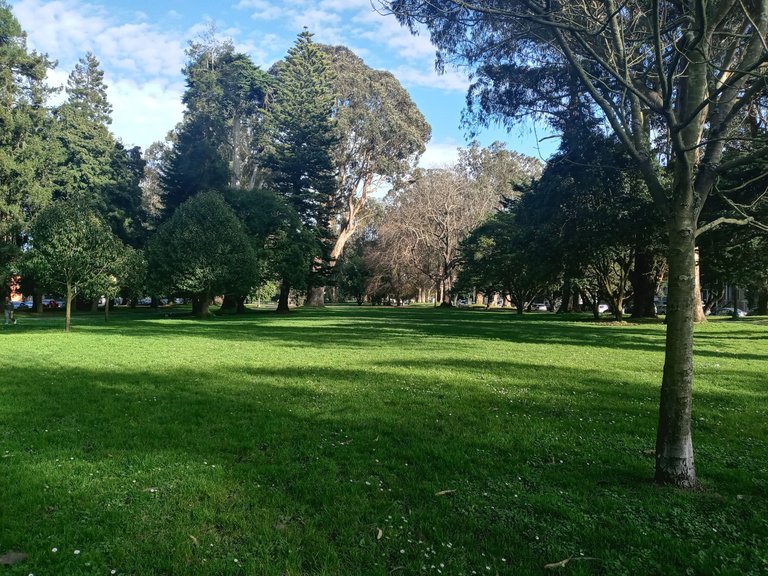
His choice was "Der Lindenbaum," which loveliness tells a sad story most beautifully: the young man from Winterreise passes a linden tree under which he often rested, but now that his love is lost, even at night he passes it with closed eyes. Yet he hears the branches rustling and the tree saying, "My friend, in me you will find rest." He passes on -- even the winter wind blowing his hat back toward that tree in warning does not stop him -- but ever after, he hears that tree saying "In me, you would have found rest."
It only needs mentioning that in Song 1, this young man not only loses his love, but loses God also, claiming that God wants love to be inconstant, and thus him bereft ... and, when one realizes the linden tree often stands in for the tree of life in German thought ... and then realizes the reference goes back to the tree of life in the Garden of Eden and also stands in sometimes for the cross of Christ ... one then realizes the magnitude of the young man's refusal to go back. In "Winterreise," this young man continually chooses to go into a winter night from which he will never return, although there are signs along the way pointing back to refuge, and indicating the end to which he will come if he proceeds as he does.
"If only he had listened," my companion said quietly. "Now, in fairness, the song begins by the well, before the gate ... perhaps still on his lost love's property ... and it is night time, in winter ... if he sleeps then, he might indeed never wake ... but it is certain, because of the symbolism you and Schubert both would know from Germanic thought and from Scripture, that there is much more matter in it than that.
"But then suppose he ... or another ... had passed through a terrible storm of grief and loss, and headed out into the cold of a world bereft of all that love ... but then come to that tree of life, and heard a Voice say, 'In ME, my beloved, you STILL may find peace' ... suppose he ... or she ... had listened?"
I remembered then ... in Scripture the Lord had described what His own disciples would go through in the world, and said, 'These things I have spoken unto you, that in me ye might have peace. In the world you shall have tribulation, but be of good cheer; I have overcome the world."
"So, then, suppose he ... or she ... had walked in that faith, and come to rest? From linden trees one might have both food and shelter, for their wood is excellent, and their flowers, fruit, and leaves are edible. To work backwards: there is also a gate for safety and a well for water -- there are all things there pointing to sufficiency. Robert Stolz picked this up later, and you heard my colleagues Karl Ridderbusch and Gottlob Frick sing and put it in brighter context in 'In meinem Vaterhaus steht eine Linde' -- in my Father's house stands a linden tree! And the young man in that song leaves home to see the world, and wonders if he will ever get home again ... but suppose, Frau Mathews, suppose that one did not make that mistake, and having found that place of protection, decided to abide?"
I smiled ... indeed, my faithful teacher never missed his opportunity to prepare or reinforce a lesson. "Der Lindenbaum" is the exact opposite of the course I had chosen, in my two days of winter journeys.
"Then he ... or she ... believing in the promise, would still find that storms must come and pass over. It is the nature of the world that they must, but peace and rest would have been his ... or her ... portion. "
That storm front was now very nearly over us, off to our southwest and surely being moved by serious upper-level winds, and yet ... not a blade of grass was blowing ... it was a moment of such peace as I have rarely seen.
Photo by the author, Deeann D. Mathews, January 30, 2024
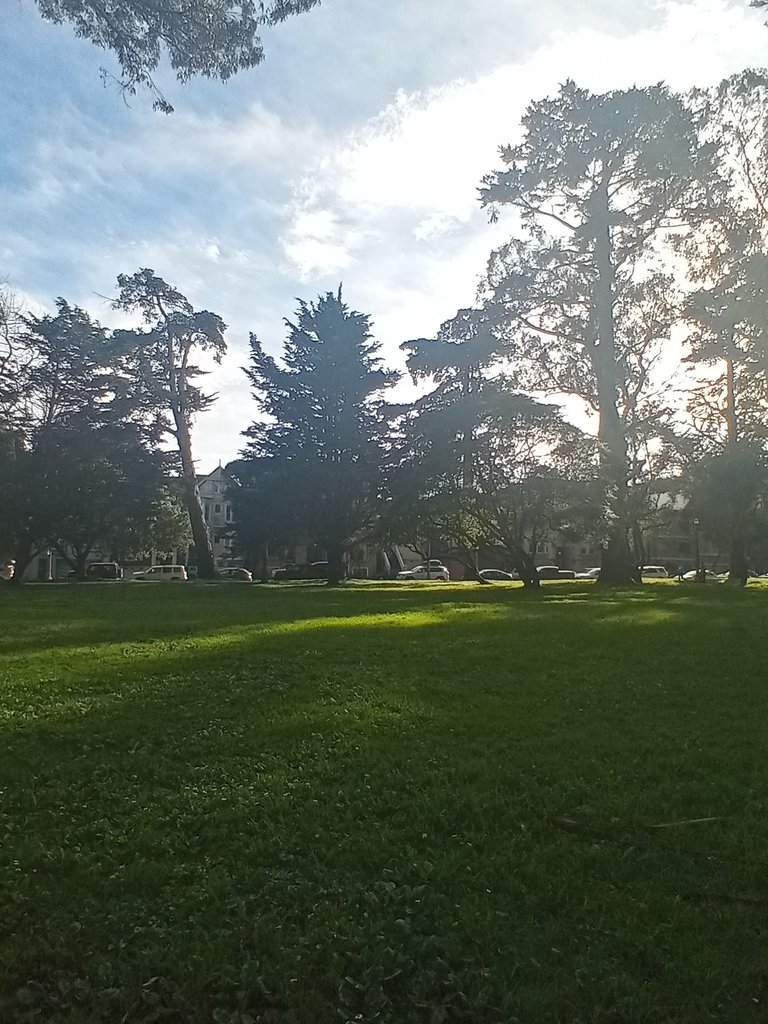
We still continued to walk into scenes of beauty and peace, though now at his pace for "Der Lindenbaum," which meant that eventually we would be overtaken by the front. But there was still no hurrying ...
Photo by the author, Deeann D. Mathews, January 30, 2024
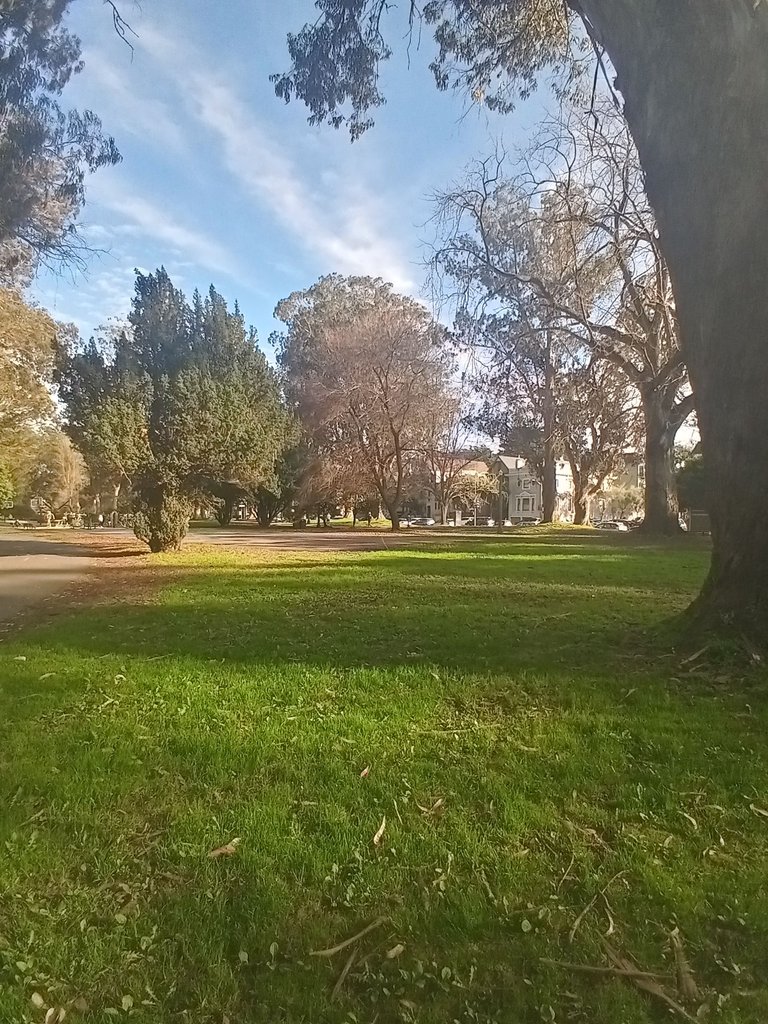
... and I noticed my companion was still so stirred up I thought he might sing again, but instead he stopped and turned to me, his face now to the approaching front as he placed his hands upon my shoulders and looked into my face with all his earnest father-love.
"Oh, Frau Mathews, meine Töchterlein, you know it is you of whom I speak -- yet I am but an echo of that Voice Who calls to you, Who has granted you these two days to know that you might, past all your recent losses, past all your striving from age 16 to here -- that you might rest in Him, and His leading, and abide in peace! Surely you hear Him -- surely! It cannot be that winter's journeys find you here, and you not know and grasp and hold these things and be assured of them!"
"Indeed, it cannot be," I said. "Nur ruhe, mein Lehrer: ich höre."
Only rest, my teacher: I hear.
His deep relief, mingled with his love, was another beauty to see on this day before he embraced me, even as the very edge of the front began to overtake us to the south, and at last the cold breath of it began to sink, though without violence still, into the park.
Photo by the author, Deeann D. Mathews, January 30, 2024
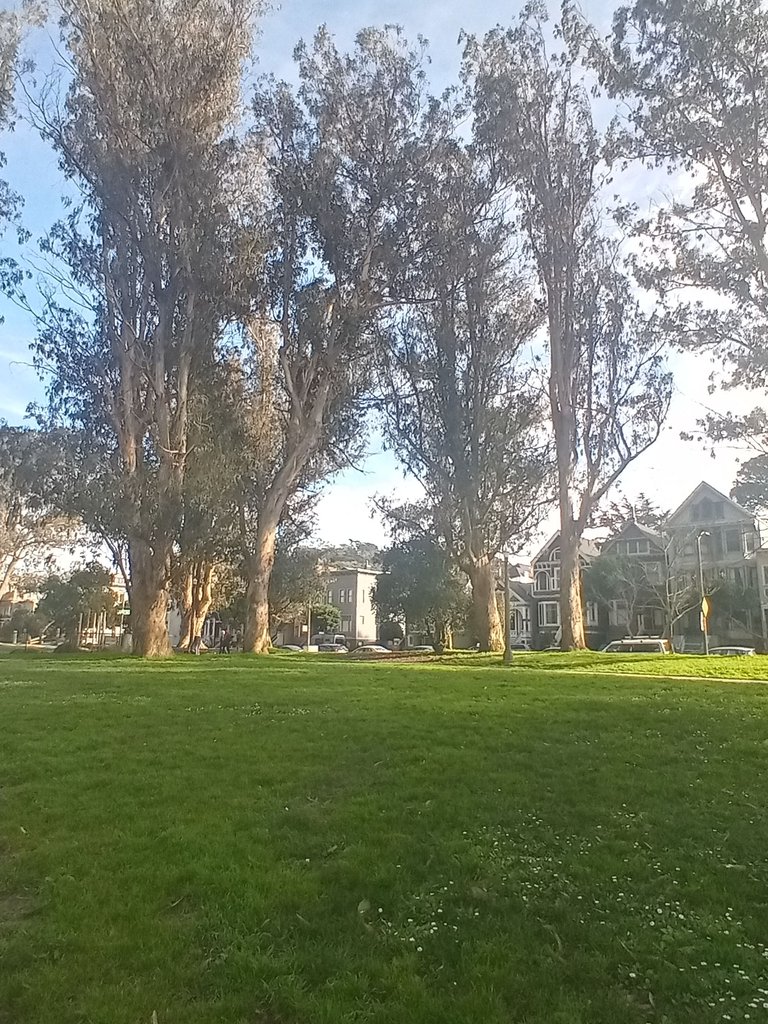
Now I did think, for a moment, that we were going to have to get moving ... but then I remembered: he was an echo of the One Who had called me. That is, if he had delayed me, he would be responsible for still getting me where I needed to be before I was chilled and wet or in any way harmed. There had not ever been nor was there any need to hurry ... not when one trusts one's guide and companion. I was getting another little object lesson, and took it, nothing doubting as I rested in my companion's great strength and shielding warmth.
Thus it was that my last sight of the halcyon outdoors was that still-undisturbed peace ... when I looked up from his embrace I was at home, warm and safe, with even that front given to me as a thing of beauty, showing its lovely silver lining. The halcyon in the world outside was over ... but for me, abiding, it was ever mine.
Photo by the author, Deeann D. Mathews, January 30, 2024

A beautiful story :) May we all listen to our guides as we walk the hills and trails 🙏
This post has been manually curated by the VYB curation project
Thank you for reading ... Q-Inspired is where I write many of my more extensive stories, based around my walks in the local parks and hills!
Frau Mathews, you know, Beethoven is brought to me today twice.
While struggling to fight back a headache, again, and having a strange dream of trying to meet/find myself, my son came from the school listening to Beethoven's Waldstein sonata from his phone! I was thinking about how smart generation of young people! They don't waste time but listen to real music even while coming home from school.
43, another smart generation 😉 but now Opus 111 and mature thoughts. Well, it's an interesting theory about this sonata, but as you say it maybe doesn't need such an explanation. I think we feel his grief, sorrows or love throughout his whole opus
The "Waldstein" was among my favorites at around your son's age, and I was also thinking of it this week ... that is a lovely sonata for the young, because it is so accessible, and yet has height and depth and opening of great emotional space ... but gently bounded ...
I think about Beethoven, because of his many, many, MANY remaining letters, that what he wanted anyone to know in the specifics of his life, he told them. This is a man who remembered, two days before his death, that his will was not as clear as it could have been, and got up and put a codicil on to make sure that his nephew got all that his uncle and adopted father had for him. Beethoven was a master communicator in word also. But "what is understood need not be explained" -- I think that Beethoven often had that in mind when he wrote music, and sought to communicate on the soul level where no words suffice.